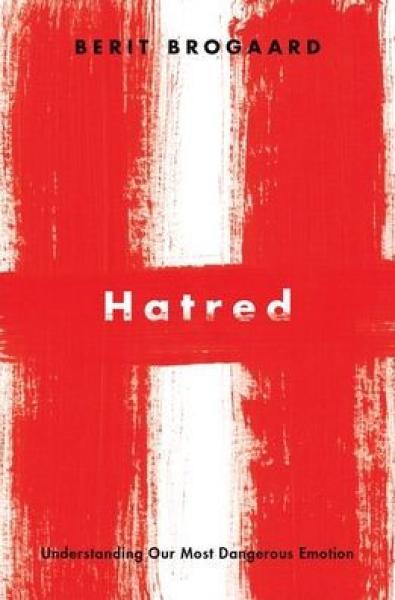Description
Brogaard makes a deep dive into the moral psychology of one of our most complex, and vivid emotions. She explores how hatred arises between people and among groups. She also shows how hate, like anger, can sometimes be appropriate and fitting. Other other questions she addresses are, how does hate differ from anger, disgust, fear, and other related emotions? Is fear an essential part of hatred? How does hatred affect what happens inside the brain? How did hate evolve in human history? Is hatred ever morally justified? Can you hate and love at the same time? Can one hate oneself? How do implicit biases trigger hatred of groups?
This accessible, timely, and novel look at an underexplored emotion will employ examples from current events as well as art and literature and popular culture.
"Hatred: Understanding Our Most Dangerous Emotion The first in-depth philosophical analysis of personal hate and group hate, Hate: Understanding Our Most Dangerous Emotion explores how personal hatred can foster domestic violence and emotional abuse, how hate-proneness is a main contributor to the aggressive tendencies of borderlines, narcissists and psychopaths, how seemingly ordinary people embark on some of history's worst hate crimes, and how cohesive groups, subjected to spontaneous forces of group polarization, can develop extremist viewpoints of the sort that motivate hate crimes, mass shootings, and terrorism. The book's first part explores hate in intimate relationships, looking for an answer to the question of why our intimate relationships can survive hate and resentment, but not disrespect or contempt. Berit "Brit" Brogaard shows that where contempt creates an irreparable power imbalance, hate is tied to fear, which our brains may reinterpret as thrill, attraction and excitement. But this can also make hate a dangerous emotion that convinces people to hang onto abusive relationships. When tied to vengeance and the dark triad of personality, hate is not only dangerous but also dehumanizing. Vengeance and the dark personalities are not essential to hate, however. Without them, hate can have more admirable ends. The book's second part explores the polarizing forces that can bias cohesive groups of like-minded individuals and contribute to what is effectively a hate crisis. Drawing on history, politics, legal theory, philosophy, and psychology, Brogaard shows how cultural myths about femininity, ethnic groups, and the land of opportunity perpetuate misogyny, white supremacy and anti-Semitism. But, she argues, politicians and policymakers have it in their power to address the hate crisis through legislation that preserves the original incentive behind the first-amendment right to free speech"--
In this important and timely work, Berit Brogaard takes on an profoundly important topic that has been surprisingly neglected by other philosophers: the psychology of hatred. Brogaard's artful exploration of the ways our animosities shape our lives is at once deeply disturbing and profoundly engaging; the reader who follows her to journey's end will be rewarded with a deepened understanding of what is it is be human, and how we all might be human better. Hatred is a remarkably substantial, sophisticated, and spirited contribution to public philosophy, and I wish we had lot more philosophy like it. -- John Doris, Cornell University
Hate turns into a wonderfully fertile source of serious thinking in Berit Brogaard's hands. When it is morally defensible to hate? When is it dehumanizing? If how and what we hate defines us, here is a timely and thoughtful manual on how to hate better and more critically. -- Laura Kipnis, Northwestern University
Product Details
- Oxford University Press, Brand
- Nov 6, 2020 Pub Date:
- 0190084448 ISBN-10:
- 9780190084448 ISBN-13:
- 432 Pages
- 7.1 in * 5.4 in * 1.6 in Dimensions:
- 1 lb Weight:




